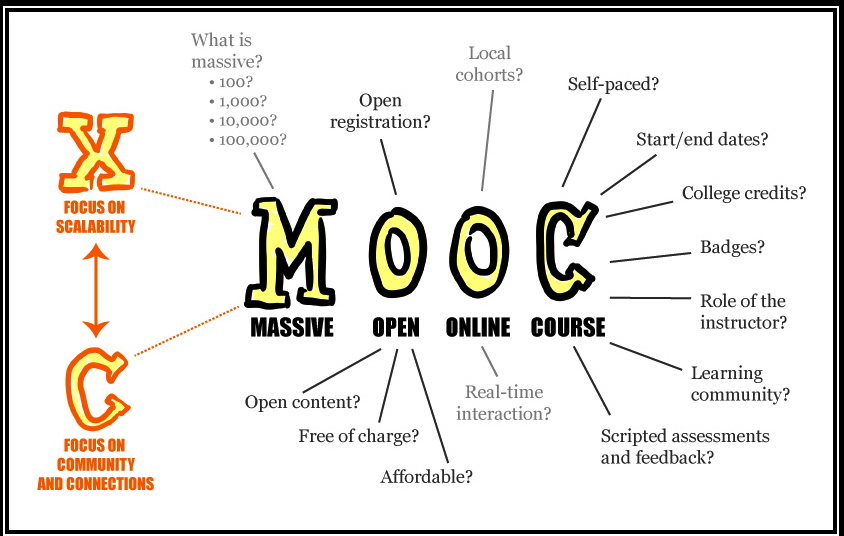MOOC: The Meaning is Negotiable

MOOC poster by Mathieu Plourde licensed CC-BY on Flickr
I don't think I am really being ethnocentric in saying that the three key players in the MOOC arena as of now are the U.S.-based Udacity, Coursera, and edX. There are many other global MOOC providers, but the majority of courses, students and media attention has been given to those three.
Using those three as examples, it is easy to see that the definition of a MOOC has great variability.
Udacity was the first to launch in 2012 and it works directly with professors rather than institutions. Coursera (currently the largest provider) contracts directly with colleges. Both are for-profit ventures.
EdX is a not-for-profit joint venture between Harvard and MIT and it also partners with other universities. edX makes its code open-source so that others can build their own platform. Recently, Google and edX announced a partnership to further develop Open edX, edX's learning platform.
I think the only place we have agreement in defining a MOOC is with that second O in the acronym. MOOCs are online. Defining massive, open and even "course" is not so easy.
As the illustration by Mathieu Plourde shown above points out even online has variations. What about if some of the participants are local cohorts participating on the host campus in a synchronous, face-to-face manner or in a hybrid setting? What about if you add other synchronous opportunities to a MOOC?
And some MOOCs are not "courses" in the traditional sense if you are thinking about assignments, grades and validated credits. The MOOC I taught this past spring was clearly more of a Conversation than a Course as it lacked all those traditional elements. I have seen one MOOC described as a massive Open Online Community.
How do you define "massive?" Some courses are not as massive as others. Although courses with more than 100,000 students still exist, some providers are focusing on smaller numbers. Is 20,000 massive enough? 1500 students certainly far exceeds the class sizes of traditional online college courses, but it seems small in comparison to the 100K+ offerings.
"Open" is the most difficult word in the MOOC package. The earliest MOOC offerings were Open in a number of ways. They were open for anyone to enroll - no prerequisites, age or location restrictions. They were free. The content was open in the open-source and Open Educational Resources sense of that word. You could reuse the content for your own purposes, possibly under a Creative Commons or similar license agreement. Many of those early offering were not officially attached to a university or organization. I participated in course offered by P2PU 5 years ago that were open in all those ways.
But, what "open" means in the world of for-profit MOOCs is quite different. I can't teach a course in Coursera without being affiliated with a college that partners with the company. In fact, the platform isn't even open to all colleges. You won't find any community colleges or below tier one colleges offering courses. The content that is there is not open to be reused. There are carefully worded contracts that include language on intellectual property. Although their courses are still free to all, we are seeing the development of tiers with some courses being offered for a cost in order to include validated assessment and credit in some form. Coursera's Signature Track is an example of this.
Are these bad things? Not necessarily. MOOCs are still in an early evolutionary stage. Offering courses with reasonable fees that lead to credits and towards degrees may be exactly the path that will allow MOOCs to prosper and grow. Faculty and course creators may feel more secure and be more willing to participate if they feel their work is truly protected. (Has anyone ever won a Creative Commons lawsuit?) Even putting restrictions on enrollment such as some prerequisite experience or knowledge testing may be useful. If I was teaching what I considered to be graduate-level material in a MOOC, I think it would be generally beneficial to not have participants who have no experience or undergraduate credits or are 11 years old in the course.
I'm working on a paper that formed from the idea that MOOCs are both a revolution and an evolution. They are another stage in the evolution of distance and online education. MOOCs today have more similarities with earlier online courses than differences. They are revolutionary in their disruption of what education means in terms of credits and degrees, access and outcomes.
The acronym MOOC may have been added in August 2013 to the online oxforddictionaries.com, but we'll see how long their definition holds. I'd say that it is already out of date.
MOOC /mo?ok/ noun - a course of study made available over the Internet without charge to a very large number of people.
Origin: early 21st century: from massive open online course, probably influenced by MMOG and MMORPG
Comments
No comments